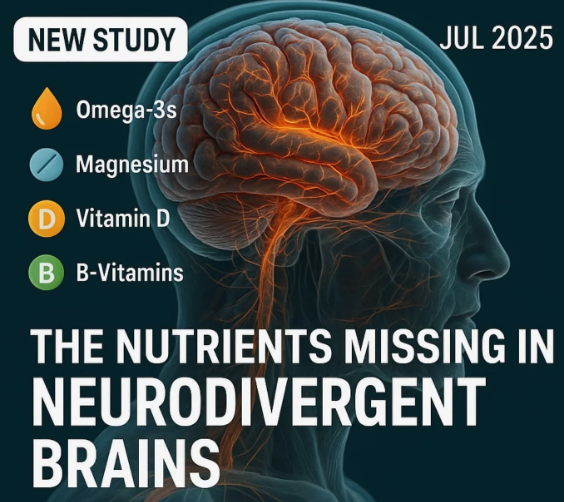
A brand-new study published in July 2025 examined nutrient profiles in children and adults with ADHD, autism, dyslexia, and other learning differences. This UK-based research is one of the most recent to investigate the biochemical and dietary factors influencing neurodivergent brain health.
The results were striking. Across all age groups and diagnoses, deficiencies were common in omega-3 fatty acids, magnesium, zinc, vitamin D, and B-vitamins. These nutrients are central to brain function, influencing neurotransmitter balance, myelin formation, synaptic signaling, and inflammation control.
In children, lower red blood cell magnesium was significantly associated with higher ADHD symptom severity and more disruptive behavior. Lower omega-3 index (EPA + DHA %) correlated with more severe learning and language difficulties. Adults showed similar nutrient insufficiencies, suggesting these gaps persist beyond childhood and may contribute to ongoing cognitive and emotional challenges.
The study also screened for food intolerances and found that over 80% of participants reacted strongly to dairy and casein, and more than half to wheat and gluten. For many neurodivergent individuals, these intolerances may add inflammatory stress, disrupt gut-brain communication, and further impair nutrient absorption.
While this was a preliminary study, the implications are clear. Addressing these deficiencies through diet and supplementation may support better cognitive performance, mood stability, and learning capacity. Omega-3s from fish oil or algae can help restore EPA and DHA levels. Magnesium glycinate is a well-absorbed form that supports neurotransmitter regulation and stress response. Vitamin D, ideally paired with vitamin K2, contributes to neural protection and bone health. B-vitamin complexes can aid energy metabolism and methylation pathways crucial for brain chemistry.
This research reinforces the importance of a nutrient-first approach to neurodivergent health. Optimizing these key nutrients is not a cure, but it can be a powerful part of a hollistic strategy for supporting focus, learning, and emotional balance.
See the original posting HERE
- Master Arithmetic with Tools at Home https://PracticalMathHelp.com
- Dyscalculia news and podcasts https://DyscalculiaHeadlines.com
- Dyscalculia for Dyslexia tutors transition training https://dys4dys.org
- Dyscalculia Services https://DyscalculiaServices.com
- Dyscalculia Awareness Training https://DyscalculiaAware.org
- Math Assessment Reasoning and Strategy https://MathStrategy.org
- Help you child with math homework https://MomsTeachMath.com
- Math and Dyscalculia Screening test https://DyscalculiaTesting.com
- Dyscalculia Screener https://DyscalculiaScreener.org
- Adult Dyscalculia https://AdultDyscalculia.org
- Become a Dyscalculia Tutor https://DyscalculiaTutorTraining.org
- Ask a question at https://Dyscalculia.ai
